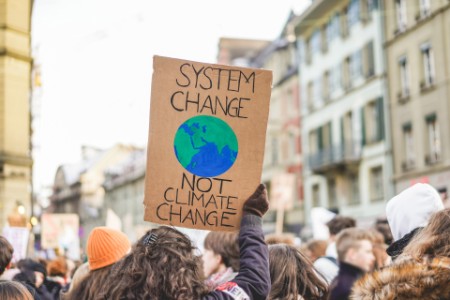
Chapter
Increase commitment to onshore renewable technologies
Significant continued deployment of onshore wind and solar technologies is necessary to meet the UK’s interim and net-zero targets.
Article contributed by Madelaine Brooks
Future Leader participant, Climate Business Forum
Maddie started her career on EDF Energy’s Commercial Graduate Scheme, working in four different business units, before taking on a role as an Analyst at EDF Renewables, valuing the financial profitability of new renewable development projects and advising on business models and strategy. She currently works as a Senior Policy and Regulation Analyst, influencing UK energy policy in the road to net-zero.

Increase commitment to onshore renewable technologies
In order to meet the UK’s net-zero target we must harness the power of all low-carbon energy sources, including increased support of onshore wind and solar generation technologies.
Onshore wind and solar are currently some of the cheapest forms of low-carbon generation and will be of crucial importance to minimise costs to the consumer as the UK decarbonises. The UK currently has 10 GW of onshore1 and 14 GW of solar capacity2 installed, however the rate of deployment of both technologies has fallen in recent years. The Climate Change Committee advised that 22-29 GW of onshore wind and 23-43 GW of solar is needed by 20303. Public opinion, particularly of onshore wind, has shifted in recent years with support at an all-time high: A YouGov poll revealed that 33% of people say they have a more positive opinion of onshore wind than they did five years ago4. Given the shift in public opinion and the increasing urgency of combatting climate change, the Government’s announcement to include onshore wind and solar in the upcoming Contracts for Difference (CfD) auction has been most welcome.
However, similar to targets set for offshore wind, the onshore wind and solar sectors would benefit from milestone commitments from the UK Government. This would give a clear signal that both sectors must continue to play an important role in helping the UK decarbonise.
There are additional positive externalities from the continued deployment of both technologies. Solar farms can improve local biodiversity, benefitting wildlife as grounds are mostly left undisturbed after initial construction. This brings more significant biodiversity benefits than other traditional uses of the land and will also contribute to Point 9 in the Government’s Ten Point plan: Protecting our natural environment. Onshore wind supports highly skilled jobs, exports and infrastructure investment across the UK: A recent report by Vivid Economics suggests that the onshore wind industry could support up to 31,000 direct and indirect jobs with a target of 35 GW by 2035.5
Onshore wind and solar can be deployed quickly, delivering short term emission reduction targets. Ambitious UK commitments for the immediate deployment of these technologies would send a strong global signal ahead of COP26, encouraging other countries to follow suit with early actions to reduce emissions. These commitments would encourage the development of the domestic supply chain, increase investor confidence, and bring about wider socioeconomic benefits helping the UK in its Green Recovery from COVID-19.

Chapter
Action for Climate Empowerment: A Proposed Eleven Point Plan
The Ten Point Plan for a Green Industrial Revolution is missing a key element for sustainable growth - Action for Climate Empowerment.
Article contributed by Serena Bashal
Future Leader participant, Climate Business Forum
Serena is a Mathematics and Biology student from London. She has been engaging with United Nations Climate Change (UNFCCC) since 2016, having been involved in several climate change projects locally, nationally and globally. She was elected as the youngest ever UNFCCC civil society Focal Point for 2019. Currently, she sits as a youth representative on the UNFCCC’s Technology Executive Committee.

Action for Climate Empowerment: A Proposed Eleven Point Plan
The Ten Point Plan for a Green Industrial Revolution is the first time that the UK has provided a holistic strategy for fostering a zero-carbon future - I applaud the Government for setting ambitious targets and recognising the importance of taking climate action seriously. While the Ten Points share a lot of infrastructural changes for a zero-carbon future, they have not considered the most important element necessary to create long-term sustainable growth: people. I believe that Action for Climate Empowerment (ACE) would help strengthen the Ten Point Plan. According to the United Nations Framework Convention on Climate Change, ACE aims to ‘empower all members of society to engage in climate action,’ encompassing six different pillars:6
- Education
- Training
- Public Awareness
- Public Participation
- Public Access to Information
- International Cooperation
Quite simply, the Ten Point Plan will not be as effective if society is not empowered to take action on each of these steps. In the official communication, the Prime Minister mentions creating and supporting up to 250,000 green jobs, yet this will only heed success if society is sufficiently educated, trained and aware of the importance of green jobs.7
ACE fits well as an Eleventh Point on the Plan, since it is an overarching theme which enhances the effectiveness of each preceding Point. For example, Point Five: Green Public Transport, Cycling and Walking. In the UK, the transport sector is responsible for the greatest amount of greenhouse gas emissions. However, for Point Five investments to prove worthwhile, the public must be educated on why public transport, cycling and walking are more environmentally friendly. Simply put, if people are not empowered to use clean transportation and if it doesn’t connect to their most needed resources, then it won’t matter if it exists or not.
For the UK to tackle climate change successfully the Government must empower and engage our community to live in a zero-carbon future. If the UK can successfully implement this proposed Eleven Point Plan for a Green Industrial Revolution, utilising ACE as the all-encompassing Point, then this would be a great display of global leadership - hopefully inspiring other countries to vastly raise ambition for climate action.

Chapter
A circular economy: cornerstone of a Green Industrial Revolution
A circular transition would ensure a sustainable recovery from COVID-19 and support the UK’s ambitions of a Green Industrial Revolution.
Article contributed by Finlay Mixon
Future Leader participant, Climate Business Forum
Finlay studies Management and Sustainable Development at the University of St Andrews. He is a Research Assistant analysing how the circular economy is taught in responsible management education and was a Sustainability Representative for his university. Finlay is also the President of St Andrews Consulting Society and has led multiple pro-bono consulting projects for SME and third-sector clients.

A circular economy: cornerstone of a Green Industrial Revolution
The linear consumption model of the global economy is reaching its limits as current levels of waste generation and depletion of natural resources are fundamentally unsustainable. 8Centred on ‘take-make-waste’ principles the linear economy involves manufacturing goods from raw materials to be sold, consumed, and eventually discarded to landfills or incinerated as waste.
This ‘throwaway mentality’ exacerbates climate change through wasted fossil fuel inputs and greenhouse gas emissions from material production and landfill gas emissions. The UK generated 221.0 million tonnes of waste in 20169 which is likely to increase given the growing demand for products and material resources10.
The circular economy proposes a solution to this by reducing overall consumption whilst also encouraging the reuse and recycling of materials to limit waste generation. It represents a viable alternative to the current economic model by promoting restorative, regenerative and sustainable value chains through implementing a closed-loop system whereby waste is eliminated, and natural resources are maintained11.
The Government’s Ten Point Plan 12details the roadmap for a Green Industrial Revolution yet could be strengthened by considering a circular transition, which could support the Government’s tripartite agenda in the Ten Point Plan to ‘build back better’, support green jobs and accelerate our path to a net-zero transition.
The circular economy is necessary for a net-zero transition as significant amounts of greenhouse gas emissions are embedded in our production and consumption of goods13. Extending the lifecycle of materials could reduce greenhouse gas emissions by 15 million tonnes- the equivalent of taking 1 in 5 cars off the road14.
It also has the potential to divert 38 million tonnes of waste from landfill and save over 21 million tonnes of material15. Moreover, it would transform the UK labour market to support green jobs; a rapid circular transition could create approximately 500,000 jobs and offset around 18% of the estimated loss of skilled labour16. The circular economy represents a lucrative economic transition with the potential to inject £75 billion into the UK economy, allowing us to build back better and recover sustainably from the economic disruption from COVD-1917.
If the Government were to consider resource use, material waste and the circular economy, it would help drive the UK’s progress in a Green Industrial Revolution as a circular transition represents a plausible, sustainable, and valuable alternative to the dominant linear economy.

Chapter
Point Eleven: Cultivating a greener agri-food sector
Incorporating the agri-food sector into the Government’s Ten Point Plan
Article contributed by Feyi Osifuwa
Future Leader participant, Climate Business Forum
Feyi is a sustainability analyst at Johnson Matthey. Prior to her current role, she worked as a civil engineer in the US before returning to school to pursue her passion for environmental management and sustainability. During her postgraduate studies, Feyi interned as a sustainability officer for Guinness Nigeria, a subsidiary of Diageo. Feyi recently graduated with her master’s degree and serves as a future leader on the EY Climate Business Forum.

Point Eleven: Cultivating a greener agri-food sector
The food and agricultural sectors are major contributors to our global carbon footprint. Food production consumes water, energy, fuel and other resources. In addition to these direct physical resources, food production is also responsible for emissions from packaging, transportation and storage (e.g., refrigeration).
Over one-third of food produced becomes waste. Wasted food equals wasted production resources and the generation of harmful greenhouse gases that are emitted when food decomposes in landfills. If I were to add to the Ten Point Plan, I would focus on methods to eliminate food waste and the emissions generated by the agriculture sector.
There are several possible approaches for combatting food waste:
- Incentives to reduce the amount of food waste created by producers, retailers and consumers (e.g., incentives for food donations)
- Caps on food waste generation and tax penalties or fines for exceeding limits
- Introduction of technologies and systems to assist the sale and use of produce prior to sell and use-by dates
- Development of new low-carbon technologies to better preserve and enhance the shelf life of perishable products
- Education on the impact of food waste on the environment and solutions for waste avoidance (e.g., campaigns to encourage the use of “wonky” vegetables)
- Universal provision of composting and food waste bins to support the reduction of domestic food waste
- Systematic routing of food waste unfit for human or animal consumption to compost or anaerobic digestion plants, thus transforming waste to energy (thereby reducing associated harmful emissions from food waste decomposition and producing renewable power and fuels)
In addition to addressing food waste, the Ten Point Plan could also be strengthened by including measures to reduce emissions generated by the UK’s agricultural sector. Action should be taken to increase awareness of intensive farming practices that generate large amounts of greenhouse gas emissions. The deployment of new technologies should be accelerated to improve farming practices such as irrigation, crop and livestock monitoring, and fleet management.
This should be done concurrently with the establishment of incentives for farmers to conduct rewilding and reforestation projects, and shift away from intensive monoculture farming that leads to long-term soil degradation and nutrient loss. This would help to ensure increased ecological diversity across the UK and to maintain the carbon sinks that are crucial for meeting national emissions reduction targets.

Chapter
Towards a just UK Transition
Why the UK Government’s plan for a Green Industrial Revolution must consider climate justice
Article contributed by Manon Burbidge
Future Leader participant, Climate Business Forum
Manon holds degrees in Human Ecology and Physical Geography. She splits her time researching fuel poverty, energy injustice and housing at the University of Manchester, and in policy and communications for the World Cement Association. She is passionate about gender equality, founding the Gender Focus Network to improve women’s representation in the cement industry.

Towards a just UK Transition
Climate justice describes a global phenomenon whereby the lowest-income and most socially disadvantaged groups historically have, and continue to, contribute the least to climate change, but are most likely to be negatively impacted by it. When the term is mentioned, what may come to mind is wealthy nations’ disproportionate historical emissions contributions, disappearing islands under rising seas, climate refugees and so on.
The reality isthat climate injustice also takes place much closer to home.
Across the UK, the highest earning in society disproportionately create greenhouse gas emissions. The wealthiest 10% create triple the amount of household and transport emissions than the poorest 10% of earners, 17 but climate risk and environmental degradation geographically map onto socially deprived areas with vulnerable populations.
We need a transition that is inclusive of the understandings and experiences of vulnerable and marginalised groups, so it does not place disproportionate burdens on these communities and solely benefit those making decisions.
It’s important that the transition to net-zero is paid for by the people who can afford to pay, which broadly is the group who is responsible for higher rates of emissions, because it’s fair, and it’s a pragmatic way to build the broad consensus for the wide-ranging steps and behaviour changes we will all need to take to achieve the net-zero goals.
So how does this fit with the Government’s vision for a Green Industrial Revolution, considering that the terms ‘justice’, ‘equality’ and ‘fairness’ do not appear in the Ten Point Plan?
Awareness of climate and environmental justice sits alongside the government’s ‘levelling up’ infrastructure investment agenda, which can be interwoven in each of the ten points. The shift to zero-emission vehicles and green public transport, and cycle lanes and urban greening should not only benefit wealthier communities. Plans for greener buildings should encompass new social housing, which should not be built on flood plains or in places at risk of sea-level rise. Green finance and innovation schemes should be accessible and targeted at lower-income households, and green jobs should be prioritised for those who will lose out as we transition away from a carbon-intensive economy.
Without considering climate justice and inequality, the Government’s plan for a Green Industrial Revolution, will be just a transition, not a just one.
Summary
The cross-generational views of Future Leaders offer a refreshing perspective on how to further progress the Government’s Ten Point Plan and helps advance the debate on how the UK could decarbonise.


